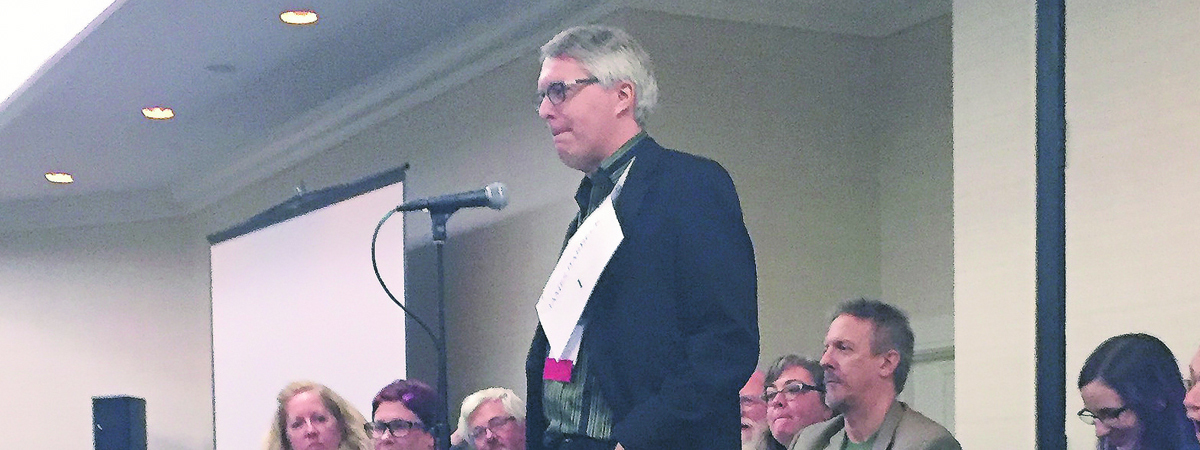
Does “impact” ever strike you as a verb? Is “very unique” inherently redundant? Does the mental strain of “irregardless” literally make your head explode?
As copy editors, we sometimes consider ourselves the gatekeepers of good language — preventing “incorrect” usage from ever stepping foot into our precious temple of the written vernacular. During a Friday morning session of the 2017 ACES conference, James Harbeck, a longtime linguist and editor from Toronto, suggests that the idea of wrong and right in writing is a myth. Using numerous humorous examples, he showed how the spelling, grammar, and usage “rules” copy editors apply today are full of surprising logical contradictions that reflect once-controversial trends.
When editing in earlier centuries, for example, we might have wielded our mighty red pens to replace “car” with “automobile” and queried “nice” when used for anything other than its original definition of “ignorant.” Indeed, the latter is how editors look when we insist that our writers uphold a word’s original meaning or risk breaching some supreme grammar code of ethics: Language was and never will be fully baked. From Harbeck’s session, we learn that the “s” in “island” was added almost arbitrarily and that the bar on split infinitives was an intentional reversal of a natural trend.
But what’s natural? Harbeck explained that organic language shifts (including conjunctions at the starts of sentences) tend to emerge under specific conditions. Professions or communities sometimes adopt new usages to distinguish themselves from broader groups, such as the working class’s preference to say and write “beef” rather than the elite’s French-derived “boeuf.” New usages and words also arise out of convenience and simplicity for clunky syntax — “ya’ll” instead of “you all” or “incentivize” rather than “give incentive to.” Harbeck points to linguistic research to say that — more than any other demographic — young women are essential for the broader adoption of a new turn of phrase.
Given this critical demographic, it’s perhaps unsurprising that the marketing industry can have a strong effect on the English lexicon — these women historically are target audiences of commercial advertising. Yet marketing jargon and other clever words do not always succeed in penetrating our common speech. “Plutoed,” for example, has yet to gain a serious foothold to convey an idea that was downgraded akin to the pre-2006 status of the ninth planet.
“Everyone loses sooner or later,” Harbeck said of the effort to infiltrate and protect language usage. “The key is to be the last one standing in the spelling bee.”
The joke was not lost on the session’s attendees, as Harbeck had won the ACES Education Fund’s annual competition the night before.
At the D.C.-area strategic communications firm Reingold, where I work, jargon discussions occur often and with much gusto. Where does one cross the line from innovative to incorrect? During his session, Harbeck dismissed this line altogether: The whole English language is a slippery slope, and, as editors, we’re “getting paid for our judgment.” This notion was underscored by University of Michigan professor Anne Curzan’s keynote speech later in the day, where she encouraged editors to be less rigid — though not less thoughtful — about language choices.
Perhaps the lesson is that editors can build trust with our writers by demonstrating forward-thinking acceptance of how they leverage impactful thought leadership in the English language. If, as Harbeck says, “words are known by the company they keep,” then we may want to consider being on the leading edge of these usage conversations, rather than on the mocking slide deck of the next century. Similarly, Curzan might urge us to lean into seemingly inevitable changes and preserve our editorial capital for crises in clarity for the modern reader.
For Harbeck’s part, he offers these guidelines when ruling on new usages and words: Consider the source of the suggested change, the audience for a particular piece, and the gains and losses from making the change. If the audience will push back, for example — ranking high on his “language crustiness index (LCI)” — it may not be worth drawing attention to allegedly improper usage. Overall, a change should be evaluated on a case-by-case basis.
As for the future of language, Harbeck predicts there will be greater flexibility in words’ class boundaries and argument structures, that second-language speakers will bear strong influence, that the singular “they” will make a comeback (prescient for AP’s announcement later in the day), and that we’ll be more lenient with dangling modifiers and capitalization.
What are your predictions? Where is the line, if anywhere? Start a conversation below.